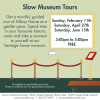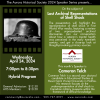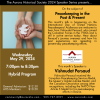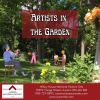Baker, Dorothy (2014) Transcript
October 25th, 2014
Seline Interviewing Dorothy Baker
ST: Okay, umm, my name is Seline, and I’m going to be interviewing Dorothy Baker for the Let’s Talk Aurora Historica- Histori-, History Project on October 25th, 2014.
So Dorothy, how long have you lived in Aurora?
DB: I was born in, on Mosely Street in 1925, and lived in Aurora until 1982 when I moved with my husband and family to Halliburton, and lived there for 18 years and the property became just a little too much for us to manage and to moved to Uxbrudge where our son and his family reside, we thought that was an appropriate move at that time. We did that in the year 2000. And now I’m just thinking about another move, looking around.
ST: Oh, how long have you, uh, what school did you go to as a child?
DB: Well I went to the Aurora Public School, which um, is the, it was the first year of kindergarten, so I was allowed to go to school. The entrance age at that time, in 1930, was 7 years, I believe. And the first year of their kindergarten with that school. I was allowed to go to the first kindergarten, and it was established in what I guess is called the Wells Street School. And our playground was in the park and Ruth Webster was the kindergarten teacher. So I was very happy that they allowed me to go, even though my birthday was in November and school started in September, but they were willing to let me enter a class there.
ST: What about your principle, can you tell me about M- McDonald?
DB: Mac MacDonald?
ST: Yeah
DB: Oh yes, he was a much loved principal. Loved by the students, and loved by the parents as well. And, you would see him walking home for lunch, because he lived on Wellington, and that wasn’t too far from the Aurora Public School, which was in the old um, well it’s where the historical society started out, in the old school across from the Anglican Church. I guess it’s still there. But Mac would, Mac Macdonald was just such a popular guy. He always had children of all ages clinging to him and wanting to take his hand and be helped across the street or that sort of thing. And one of my fond memories when I was in his class and we had oral compositions, I don’t know what you’d call it today, but we could pick a subject, and I guess Mac got, Mr. MacDonald, got a little bored listening to all us and he’d, he’d doze off and as time went on, I guess he was near retirement age then, and he would hear that everything was quiet and he says “Next one please!” And so, he was a wonderful principal, and he was loved, as I said, by students and their parents.
ST: So what did you do for extra-curricular activities?
DB: Well I took music, I took piano, and I, Mr. Harris was our music teacher at school, and he also gave private lessons. And I was in the choir, and in the choir at Aurora United Church, the junior choir. And I guess I have to say that we had, we would have a music festival each year in the spring and it was held in the Aurora United Church. And there was an adjudicator and I remember one year in particular I was asked to sing a solo, and I don’t think I had an extra-ordinary good voice but I was asked to sing a solo, and I remember the adjudicator said “This is a voice of fine promise.” So when you’re at that age you think, oh you’re going to New York, you’re gonna set the world on fire. But it was just a very nice thing to say, I suppose the other students felt the same he felt the same way about the fact that you participated was interesting for him.
ST: So you were involved with that church?
DB: I was involved with the Aurora United Church, yes. And of course very saddened that it’s not standing now. And I think I’m hearing some positive things that it will be reconstructed.
ST: So how did you and your husband, Stan, meet?
DB: Well, he was in Richmond Hill and going to highschool in Richmond Hill and the Richmond Hill Basketball team came up to battle it out with the Aurora High school team. So that’s how we met, I guess we were 16 years old then. And uh, we would see each other at school functions and then he realized that, you know the war was ongoing, and that he would be, he would be going off to war when he was 18, because conscription had come in at that time. And so he joined the Navy, I guess a few months before he was conscripted, so he wanted to have a choice of the service and the navy interested him.
ST: So how was that for you?
DB: Well I was very sad. All my friends from school had, the boys, had gone off to war. Some of them in the air force, I remember Anson Gilbert, in the air force. And I remember Craig McKenzie in the airforce. And there was a neighbour of ours who was with the, um, tank core, and he was, unfortunately lost his life in France, I do believe, with a bomb hitting his tank, fire ensued. But, those were not happy days they were very busy days. Our home at 95 Mosely Street, my mother was a gifted dress maker, just for our own family, I always had homemade clothes when I went to school and people were kind enough to say I was one of the best dressed. They didn’t know that it was probably a dress that mother had taken apart and maybe turned to the other side and made a smart little outfit by adding some tape and whatnot, for me to wear. Because we were just getting over the depression, we were just starting to move out of the depression which happened, you know, after the crash of 29, 1929. It wasn’t felt in our home because my father was a builder, and he still had on-going projects and, you know, houses partly built, and that sort of thing. And so we weren’t aware of it in our home until about 1934, and I think most people felt the depression from about 1930. And people who were, who lived closer to the GM, General Motors plant in Oshawa were very very aware of it because the automobile industry just went down very quickly.
ST: Did you have a car back then?
DB: Oh yes, not personally, no.
ST: Your family?
DB: Family had a car, a Pontiac, it was a 29 Pontiac, but I don’t think that car was replaced. My father seemed to be able to repair it, I don’t think it was replaced until about 10 years later, when unfortunately I guess, the war, brought with it jobs in munitions and military. Even though the carpenters and builders, as my father was, there weren’t materials to get on with their work and he was invited to oversee a plant in Aurora that had something to do with the repairs of machinery that was used during the war. So, in Aurora we actually had soldiers posted, and it was part of the military, the army, and everybody was, it seemed everybody was involved with the war effort. And our dining room in 95 Mosely Street, it wasn’t a dining room anymore because mother was looking after the sewing that had to be done, uniforms, and also sewing for the people who were defending Britain, I think they called them the land armies in Britain. She was, had several sewers from the east end of Aurora, and they met every week and they took the army clothes, and the land army clothes, home to be repaired and made and so there would be 25 pants that just came to over the knee, and the socks came up, the knee high socks. And the army, the land armies in Britain needed those. But we got through, we got through the war, they were not happy times, but it seemed as though all the young people, you know you think of going out to a dance, and well the fellows, unless they were home on leave, there wouldn’t be men around, there wouldn’t be, there were very few. Unless it happened to be a Christmas party.
ST: So how did the Town of Aurora change during the war?
DB: How did it change, well, especially this weekend when we’re thinking about what happened in Ottawa, and I heard the term used, “We all came together.” And I think that’s what I have to say about during the war. We all came together, it was working for the war effort, and of course there, we were restricted in what we could buy, we had tickets, I would call them, for sugar and flour, and I believe meat as well, I stand to be corrected on that, but we could only purchase according to the number of people in your family. Because the, those products had to be used to feed the, the army and the war effort. There weren’t the transportation, the transportation wasn’t the way it is today. Getting the beef from say, out west, or chicken from… the transportation, and gas was rationed of course, so we got very accustomed to that. Taught us a lot, during the war. We were glad to see the end. My husband was home on leave, he had been in the navy over two years without a leave and his ship, HMCS Hespeler had been for refit in Halifax and he was allowed, I think it was a month or 6 weeks to be home. And he asked me to marry him while he was home, and that was in May of 1945 and we waited until 1947. He went back, even though the war in Europe was over, there was still Japa- the war with Japan was still ongoing. And he went back and joined for the, and said “things are not finished yet.” and he went back to be with his ship as it went through the Panama Canal and I think they were just off San Francisco when the Atomic Bomb was dropped and it was just within hours that the war ended then. But still there were Japanese subs that hadn’t received the message quite, in the Pacific. So he didn’t get home until December of 1945. So that was a great Christmas and I guess we both wanted to get married and set up house keeping. There just were no rental properties, so finally in1947 we thought, well maybe this relationship should end, you know, unless we could find a place to live. So my parents lived in 95 Mosley and, now that is a recent picture of the house.
ST: Oh, I’ve seen that house.
DB: Have you? And so they made the upper part, three rooms upstairs, into an apartment for us. And so we did get married in 1947, in September of 1947, and we celebrated our 65th wedding anniversary in 2012. And that’s a picture of the celebration. The rest of the people were down this way. And my husband then died, that was in September, the end of September. He died at Christmastime that same year. But we’d been married for 65 years and had 2 children.
ST: What was it like raising a family in Aurora?
DB: I’m sorry?
ST: What was it like raising a family? Were there any challenges?
DB: Well I guess so, our son said that he was, while he was in high school he was stopped several times and asked about the purchase of some drugs. Now that, that had never happened in the, in the schools in Aurora. That would be, well I supposed he’d be in school when he was about 16 or so, and came home with this story, and this was quite new information that, that there was a possibility of drugs being in the high school in Aurora. I’m sure that the people who were in charge, the board and the teachers, would’ve stomped on that very quickly.
Mr. J.H. Knowles was principal of that high school then, and Mr. Adams was head of history. Mr. Johnson, head of science, and after Mr. Johnson, Mr. Johnson was principal after Mr. J.H. Knowles and after Norm Johnson retired then Arnold Miller, who was a mathematics teacher, he became principal for Williams High School.
ST: So what was your best memory of Aurora?
DB: Oh, just having fun. You know, it, the parties we had as we were growing up would be in the winter, we’d take our toboggans and go out with friends to Sheppards, Sheppards Bush, and there was a beautiful hill that we enjoyed tobogganing down. And then we’d come back to the house and I remember, as young people, late public school, Mother and Dad would make hot chocolate and have sandwiches and cake. And that was good because the next day you’d be out, either skating or going down the hill so it was okay to have chocolate cake at night.
ST: Do you want to tell me a little bit about your involvement with the Aurora Historical Society?
DB: Yes, I, Marjorie Richardson approached me about the, my name was Richardson before I was married, and she knew that my grandmother, Sarah Jane Richardson, had lived with us and my mother looked after her very lovingly and there was lots of information that came from that source. Grandmother Richardson, her memory was very clear right to the end, and she had lots of stories. And of course with her living with us, we had relatives coming and going, and so I got to know them as well. My involvement with the historical society, I was always very pleased to do whatever I was asked to do. And I remember the first meeting, taking minutes, and I remember Les Oliver led the transition there and the organization at that time. You mentioned the, was it the Websters were involved, who was involved in the, and is still I guess, the principal figure in the Aurora district High School, or the Aurora District Historical Society?
ST: Erika, do you know?
Erika Mazanik: John McIntyre?
DB: John McIntyre, yes and John McIntyre I think at that time was away at university in, he went to school in Maryland I believe, and when he returned to live in Aurora he took over and sure has done a wonderful job. But I can’t remember too much about my involvement except that I was secretary because, you see in 1982 we moved to Haliburton, and they did have a historical society up there, but we were newcomers, so I wouldn’t dare get involved with that.
ST: So how long were you actually a part of the Aurora Historical Society?
DB: Well I was always interested in the history in Aurora because my parents were, and my grandparents were part of Whitchurch Township, and my father was a builder in Aurora from, well I guess the time they were married. Maybe from 1920. And so I was always interested in the history. I don’t know that I contributed that much, but I know that Marjorie Richardson did, Les Oliver did, and certainly the McIntyres, the Websters, the Mcintyres contributed.
ST: Okay, well do you have anything else that you’d like to say, or any stories, or anything that I forgot?
DB: I think you’ve covered things very well, and the, I would say that maybe, maybe I have lived through the times that were the best times in Aurora, because even though there was a World War going on from 39 to 45, 1939 to 1945, we dealt with that and just made the best of it. But the social unrest that there seems to be today, was not part of our lives. And we dealt with the recession, depression, we dealt with that because everybody was in the same – not only the builders, because they couldn’t get materials, or people didn’t have the money to put the new roof on the house and they just patched it up. But we were all in the sa- we were all in the same situation. We didn’t have the drug problems that are prevalent today. I would say we learned a lot, from living in those times. I still am very careful about preparation of food, I don’t wish to waste anything, and the spending of, making sure that the spending of money is dealt with, and that the charities are looked after. I just hope that the wonderful people continuing with the history will continue, and I’m glad that you as a student are interested, because this is the way we, this is the way we contribute to our society, and I’m pleased to see so many young people interested.
ST: Okay, Thank you so much for coming today and answering the questions about your life.
DB: Well it’s been a pleasure.
End: 31:49

















